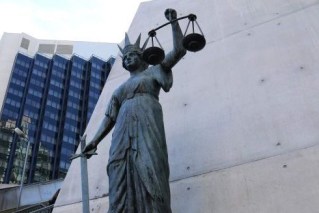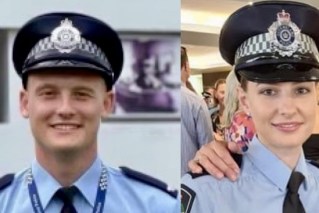The life, crimes and death of a crooked cop who made corruption a household word
If the NSW Police Force of the 1970s and 80s looked vastly more corrupt than it does today, the man perhaps most responsible for the reputation is Roger Rogerson.

Former Detective Roger Rogerson is led to a prison van at the NSW Supreme Court in Sydney, Friday, June 3, 2016. Rogerson and Glen McNamara have both pleaded not guilty to murdering 20-year old student Jamie Gao in May 2014. (AAP Image/David Moir)
Rogerson died on Sunday weeks after his 83rd birthday, his name forever synonymous with police corruption.
At the time, “The Dodger”, who in his heyday was described as “the life of the party”, was serving a life sentence for murdering a 20-year-old drug-dealer Jamie Gao.
The crime was the final chapter in the high-profile fall-from-grace story of a cop who went into business with the likes of crime boss Abe Saffron, heroin dealer Arthur “Neddy” Smith and “Mr Rent-a-Kill” Christopher Dale Flannery.
Rogerson’s death marks the end of an era known for police working side by side with crooks to run the streets of Sydney with near impunity.
While spectacular in its cold-blooded style, Gao’s murder was far from the first time Rogerson had found himself on the wrong side of the law.
It would, however, be his downfall.
Rogerson grew up in the working class suburb of Bankstown in Sydney’s southwestern fringe and as a child was a prodigiously talented pianist, a skill he used to play show tunes for the folk at his mother’s aged care facility and later his fellow inmates.
When he turned 18 in 1958 he joined the NSW Police Force and quickly made a name for himself as an integral member of the armed hold-up squad.
In 1980, he received the distinguished Peter Mitchell Award after arresting an escaped armed robber but a year later he was facing scrutiny after shooting dead 22-year-old heroin dealer Warren Lanfranchi in a Sydney laneway.
Rogerson was cleared of wrongdoing after an inquest, but a jury declined to find he shot Lanfranchi in the course of duty or in self-defence.
Lanfranchi’s girlfriend Sallie-Anne Huckstepp sensationally accused Rogerson of murdering her lover and was found strangled and drowned in Sydney’s Centennial Park in 1986.
Convicted murderer, rapist and underworld kingpin “Neddy” Smith was charged and acquitted of murdering Ms Huckstepp in 1999.
During the trial, Crown prosecutor Patrick Power told the jury Smith had the ability to kill Ms Huckstepp because Rogerson and others had given him “the green light” to commit crimes.
Rogerson again found himself at the centre of serious allegations following the 1984 shooting of drug squad detective Michael Drury.
Drury survived after being shot twice through his kitchen window and accused Rogerson of orchestrating the hit because he refused to accept a bribe in exchange for not giving evidence in a major heroin case.
Rogerson was found not guilty in 1989 of conspiracy to murder but his reputation was in ruins and the high-profile case led to accusations of widespread corruption within the police service.
In 1992, Rogerson experienced the inside of a prison cell for the first time, serving three years for conspiring to pervert the course of justice after depositing $110,000 into bank accounts using false names.
Dismissed from the force for the crime, Rogerson harnessed his brand of charismatic machismo to launch himself as a raconteur-for-hire, brazenly telling tales about Sydney’s underbelly in a theatre comedy show called The Wild Colonial Psychos, alongside Mark “Chopper” Read and former Aussie Rules footballer, Mark “Jacko” Jackson.
Richard Roxburgh depicted Rogerson in the 1995 television mini-series Blue Murder as the swashbuckling, hard-as-nails, fearless cop who was in cahoots with prominent underworld figures
The Independent Independent Commission Against Corruption determined Rogerson was corrupt, with Commissioner Ian Temby writing in his 1994 report into the relationship between police and criminals that “Rogerson’s dealings with (Neddy) Smith brought discredit on the Police Service, and must be described as scandalous”.
Rogerson was jailed again in 2005 for 12 months after admitting lying to the Police Integrity Commission, at a hearing into possible corruption at Liverpool City Council.
Nine years later Rogerson teamed up with former detective Glen McNamara to murder Gao, who they shot dead in a Sydney storage unit to steal nearly three kilos of the drug ice worth $19 million.
Gao’s body was quickly found in a surfboard bag floating in waters off Cronulla and the damning trail of evidence left by the former detectives included CCTV of the pair entering the storage unit and emerging half an hour later dragging a surfboard cover of “considerable weight”.
It took a jury six-and-a-half days to reject the men’s defences, with each blaming the other for murdering Gao, and unanimously find them both guilty of murder.
Facing a life sentence, Rogerson appealed several times unsuccessfully to have his conviction overturned, with a final bid rejected by the High Court in March 2023.
Less than a year later, his health took a turn for the worse and on Sunday, he was pronounced dead at Sydney’s Prince of Wales Hospital, where he had spent three days after being transferred from prison.












